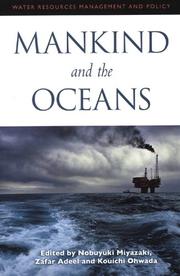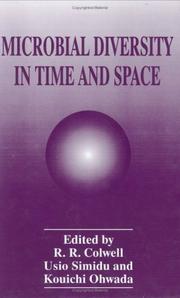| Listing 1 - 3 of 3 |
Sort by
|

ISBN: 928081057X Year: 2005 Publisher: Tokyo, Japan ; New York : United Nations University Press,
Abstract | Keywords | Export | Availability | Bookmark
 Loading...
Loading...Choose an application
- Reference Manager
- EndNote
- RefWorks (Direct export to RefWorks)
Marine pollution --- Marine ecology --- Oceanography --- Environmental protection --- Mer --- Ecologie marine --- Océanographie --- Environnement --- International cooperation --- Pollution --- Protection --- Coopération internationale --- Marine ecology. --- International cooperation. --- Prevention. --- Research.

ISBN: 9280870866 1423766032 9781423766032 9789280870862 928081057X 9789280810578 928081057X 9789280810578 Year: 2005 Publisher: Tokyo New York United Nations University Press
Abstract | Keywords | Export | Availability | Bookmark
 Loading...
Loading...Choose an application
- Reference Manager
- EndNote
- RefWorks (Direct export to RefWorks)
The oceans cover more than 70 percent of the Earth's surface and play an important part in our lives by controlling climate and weather conditions; hosting shipping, transportation, recreation and tourism; and providing us with food, minerals and petroleum. The relationship between mankind and the oceans has been crucial since prehistoric times. With the growth of the human population, especially in coastal zones, there is a growing threat to oceans from land-based activities such as industrial effluent, municipal sewage, and runoff from agricultural areas, as well as antifouling agents used o
Marine pollution --- Marine ecology. --- Oceanography --- Environmental protection --- Ocean --- Oceanographic research --- Biological oceanography --- Marine ecosystems --- Aquatic ecology --- Marine environment pollution --- Marine water pollution --- Ocean pollution --- Offshore water pollution --- Sea pollution --- Seawater --- Coastal zone management --- Pollution --- Water --- Marine resources conservation --- Prevention. --- Research. --- International cooperation. --- Research --- Ecology

ISBN: 0585340463 0306451948 Year: 1996 Publisher: New York, New York ; London : Plenum Press,
Abstract | Keywords | Export | Availability | Bookmark
 Loading...
Loading...Choose an application
- Reference Manager
- EndNote
- RefWorks (Direct export to RefWorks)
The symposium, "Microbial Diversity in Time and Space," was held in the Sanjo Conference Hall, University of Tokyo, Tokyo, Japan, October 24-26, 1994. The symposium was organized under the auspices of the Japanese Society of Microbial Ecology and co-sponsored by the International Union of Biological Sciences (IUBS), International Union of Microbiological Societies (IUMS), International Committee on Microbial Ecology (ICOME), and the Japanese Society of Ecology. The aim of the symposium was to stress the importance of the global role of microorganisms in developing and maintaining biodiversity. Twenty-four speakers from seven countries presented papers in the symposium and in the workshop, "Microbial Diversity and Cycling of Bioelements," that followed the symposium. Papers presented at the symposium are published in this proceedings. Discussions of the workshop, which were energetic and enthusiastic, are also summarized in this proceedings. The symposium provided an opportunity to address the role of microorganisms in global cycles and as the basic support ofbiodiversity on the planet. Previously unrecognized as both contributing to and sustaining biodiversity, microorganisms are now considered to be primary elements of, and a driving force in, biodiversity. Financial support was provided for the symposium by the CIBA GEIGY Foundation for the Promotion of Science, Naito Foundation, and the Uchida Foundation of the Ocean Research Institute, University of Tokyo. Support from these foundations is gratefully acknowledged. CONTENTS Microbial Biodiversity-Global Aspects ................................. 1 Rita R. Colwell 2. Importance of Community Relationships in Biodiversity ...................
Bacterial diversity --- Microbiology --- Biochemistry. --- Microbiology. --- Biotechnology. --- Ecology. --- Botany. --- Biochemistry, general. --- Medical Microbiology. --- Plant Sciences. --- Ecology . --- Medical microbiology. --- Plant science.
| Listing 1 - 3 of 3 |
Sort by
|

 Search
Search Feedback
Feedback About UniCat
About UniCat  Help
Help News
News